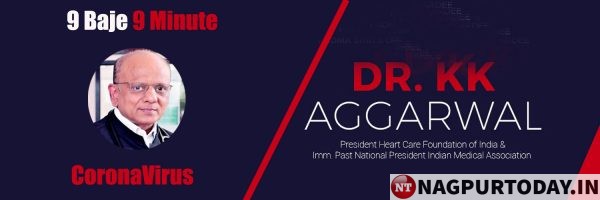
On Friday, Prime Minister Narendra Modi urged to the citizens of India to turn their lights off and light candles or diyas or turn on their mobile torches on April 5 at 9 pm for 9 minutes to show they were together in the fight against coronavirus.
“On this Sunday, April 5, we will challenge the darkness of coronavirus threat together. On April 5, at 9 pm, I need your 9 minutes. At 9 pm, turn off all the lights in your houses and light a Diya, candle, torch or flashlight for 9 minutes at your doors, or balcony,” Modi said.
The Prime Minister added that this will send out a message that nobody among the 130 crore Indians is alone in this fight against the deadly infection.
After Modi’s address to the nation, MyGovIndia, citizen engagement platform of Government of India, posted a video of Dr KK Agarwal. In the video, he called PM Modi’s suggestion as a masterstroke. In the now delted tweet, he said, “Lighting the lamp at 9 pm for 9 minutes is based on the principle of collective consciousness.” ” The collective consciousness of people will ensure that the virus does not attach itself on the ACE2-receptor.’’
In a tweet, he also said that Modi’s unique exercise is “based on yoga vashishta chapter six the principle of collective consciousness”.
Deleted tweet from @mygovindia handle giving a scientific justification for picking candles at 9 PM
This appears to be Dr KK Agarwal pic.twitter.com/3Kl4j40jS0
— Nirmalya Dutta (@nirmalyadutta23) April 3, 2020
In a tweet, he also said that Modi’s unique exercise is “based on yoga vashishta chapter six the principle of collective consciousness”.
based on yoga vashishta chapter six the principle of collective consciousness https://t.co/VFMBlbXgDs
— Dr K K Aggarwal (@DrKKAggarwal) April 3, 2020
Who is Dr KK Aggarwal?
Dr KK Aggarwal, born in New Delhi on 5 September 1958, is a physician and cardiologist. He did his medical studies (MBBS) from Nagpur University.
He is currently the President of Confederation of Medical Associations of Asia and Oceania (CMAAO) and Heart Care Foundation of India. He is the former President of National President of Indian Medical Association.
Aggarwal has received many awards over the years, the biggest being from the Government of India. In 2010, he was awarded the Padma Shri, the fourth-highest civilian award, for his contributions to the field of medicine.












